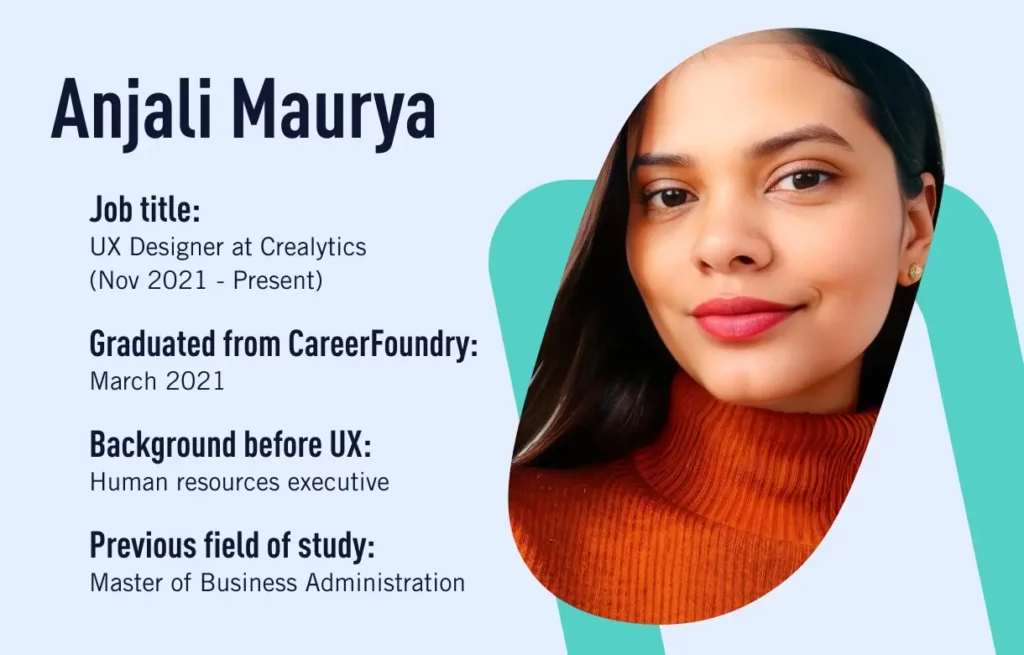
Imagine turning the tables on your career, plunging into an unfamiliar sector, and doing it all in a different country. Sounds daunting, doesn’t it? But that’s exactly what CareerFoundry graduate Anjali Maurya did. She bravely transitioned from a flourishing career in human resources (HR) in India, to become a user experience (UX) designer in Berlin, Germany.
If you’re considering a career change from HR, have you thought about UX design? It might surprise you to know that the soft skills you’ve developed in HR—such as effective communication, empathy, collaboration, and adaptability—are equally crucial in UX design.
Anjali is a testament to how women can succeed and thrive in the dynamic tech industry, where there is sadly still large gender misrepresentation. The reasons are complex and multifaceted, but one reason is the lack of female role models in the industry. In 2022, only 24% of computing jobs were held by women and only 19% of STEM majors were women. When women don’t see other women in tech, they may not consider it as a viable career option.
But, in the face of emigration challenges and the gender imbalance in tech, Anjali didn’t let this set her back when moving to Berlin. She discovered the intersection of HR and UX where she really could really excel in her new domain and bring her unique perspective: prioritizing user needs and striving to enhance people’s lives.
Let’s dive into Anjali’s story to learn how she made a career change from HR to UX design.
Hi Anjali! Please can you tell us a bit about your background?
Hello! Yes, I am Anjali Maurya, originally from India and now based in Berlin. Back in India, I worked as an HR recruiter for an IT company. While recruiting for various profiles, including designers, developers, installers, and salespersons, I discovered something that truly inspired me: design.
As I came across designers and their portfolios, I saw some of the best work in the industry! It sparked my curiosity, and I began asking them design-related questions. The more I learned, the more I realized that I wanted to pursue a creative career as well.
A few months later, my spouse and I moved to Berlin, a city brimming with opportunities. I thought it was the perfect time for me to make a career switch and follow my passion!
So, you decided to make a career change from HR. How did you start learning about UX and UI design?
I found it difficult to navigate my new path. I began learning design tools on my own through YouTube videos, but I soon realized that I needed more structured guidance and support. That’s when I made the decision to take a UX/UI design course and study with CareerFoundry.
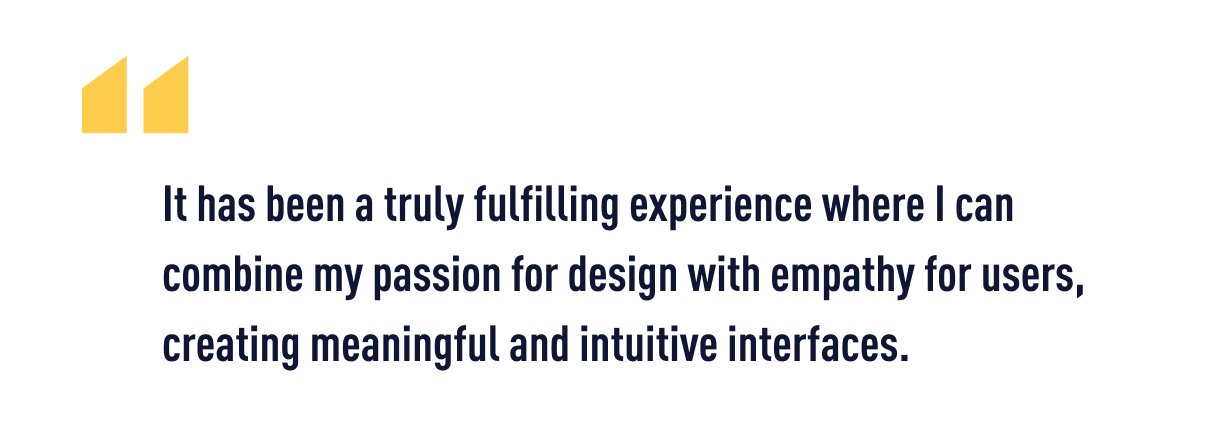
Why did you decide to study with CareerFoundry?
It was a big challenge deciding to make a career change from HR during COVID when there was a complete lockdown, so I really had no idea where to start diving into a new industry and a different job market.
Luckily, I learned about the UI Design Program at CareerFoundry from a friend, and I decided to study with CareerFoundry because the learning style and chance to work with my own mentor and tutor was a big appeal.
What was the highlight of the program for you?
The highlight was the immersive exploration of user-centered design principles coupled with practical applications. I had the opportunity to work on fascinating projects that allowed me to apply my creativity, problem-solving skills, and newfound design knowledge.
I learned to prioritize user needs, preferences, and behavior patterns while also delving into color psychology, typography, and layout decisions for user-friendly designs.
What happened after you completed the program?
I got my first job as a designer job four months after graduating. It was definitely challenging, but the Job Preparation Course at CareerFoundry helped a lot in making my portfolio and CV, and the mock interviews conducted by my career specialist were very beneficial.
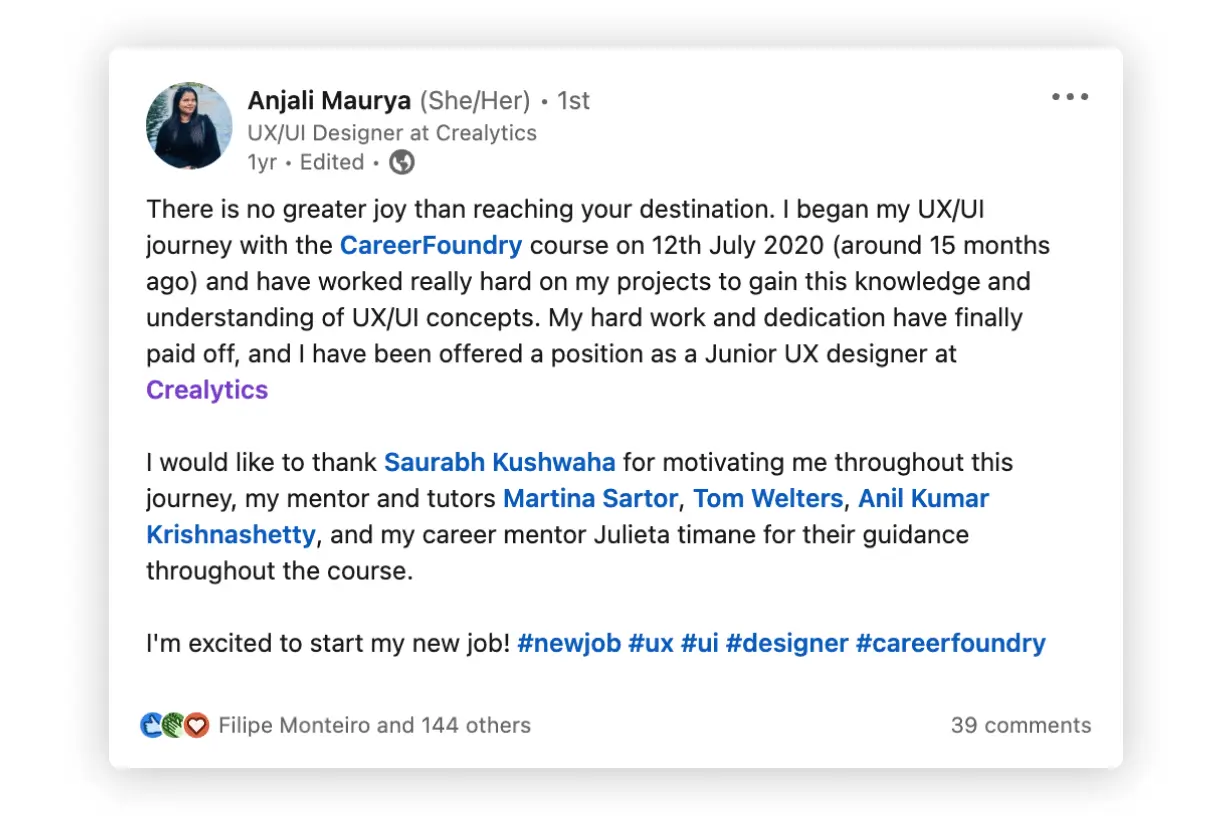
Do you feel that the program helped you upskill as you had hoped?
Yes, completely.
Hands-on processes—like constructing wireframes and prototypes—helped me understand iterative design and how to adapt designs based on user feedback, which is invaluable in my job now. Conducting usability testing with real users was also great practice.
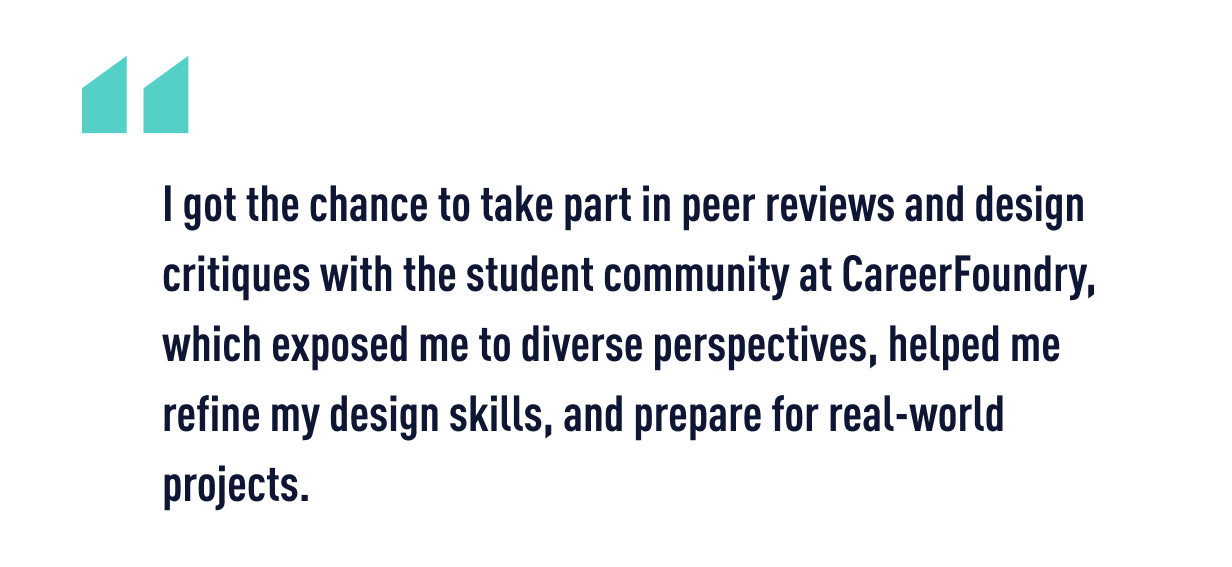
All of this had a huge impact, equipping me comprehensively for the field’s demands, and I get to put it all into practice in my job now!
Tell us about your new role at Crealytics!
Crealytics offers performance marketing solutions to the world’s leading retailers and e-commerce brands, helping them improve their advertising efforts. I was hired as a junior designer but I was recently promoted to UX designer!
I know it might be surprising that I’m working as a UX designer when I completed a UI design course, but UX and UI go hand-in-hand. I was aware of this already, so after finishing my course and while job-searching, I requested read-only access to the UX Design Program from CareerFoundry.
My UI studies had already provided me with a basic understanding of UX, but I could learn about it in greater detail by reading the UX program material.
That’s very proactive of you and a great way to broaden your skillset. What’s the most rewarding part of your new career?
For me, the most rewarding part of being a UX designer is crafting experiences that genuinely improve people’s lives. It’s incredibly fulfilling to see users navigate a product I’ve designed with ease and delight. The constant learning and collaboration also keep me inspired every day!
I’m pleased to hear it! Do you have any advice to offer other women who are considering a career in the tech industry? How should they navigate a new role?
I’d be delighted to offer a piece of advice from my journey as a woman in tech, specifically as a UX designer.
One significant lesson I’ve learned is having the strength to embrace challenges. The tech industry is very dynamic and opportunities to learn and grow are abundant. Initially, you might think that seems daunting, but don’t hesitate to tackle unfamiliar territories or tasks. Having a proactive approach to learning showcases your adaptability and resilience.
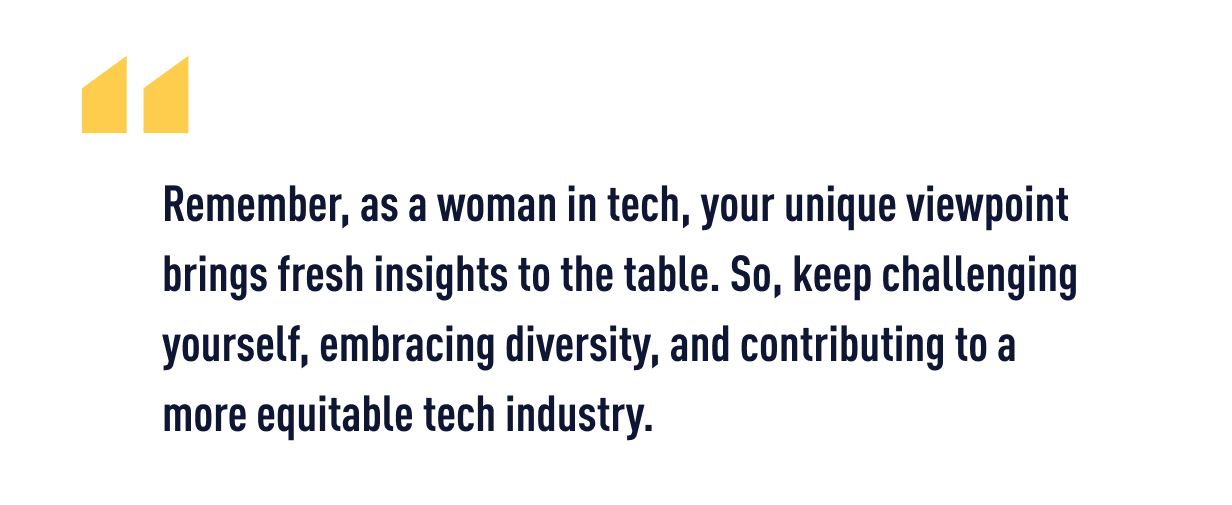
It’s never too late to pursue your passion and make a career switch. Keep learning, stay curious, and embrace new opportunities!
Well said! What are your hopes for your future career?
I want to become a UX design mentor and help aspiring designers become industry experts, especially women! Making a career change from HR means that I can put my soft skills that we’ve already talked about, like communication and problem-solving, to good use, too.
That’s a great aspiration and a great note to end on. Thanks for sharing your inspiring story with us, Anjali!
Remember the path to success is rarely a straight line. When we dare to explore new avenues, we can discover passions and abilities we never knew we had, just as Anjali did! She discovered the world of UX/UI design is filled with endless possibilities for creativity, problem-solving, and technological innovation.
If you’re interested in making a career change from HR to UX/UI design too, here’s some tips on getting started:
- Research: Learn as much as you can about the field of design. Understand what UX and UI designers do on a daily basis and what skills, tools, and knowledge are required. Check out this YouTube video for more insights into the role of a UX designer.
- Explore: Get a taster for working in tech with a free, introductory short course from CareerFoundry. Try UX or UI design to understand the differences between the two professions, or try this career quiz to understand which field suits you best.
- Evaluate: Take stock of your existing skillset. Write down your achievements, strengths, and passions, as well as your soft skills. You might be surprised at which skills from HR translate well to the role of a UX/UI designer. Check out this video from CareerFoundry graduates talking all about the importance of transferable skills, and sharing the ones that served them well when making a career change to tech.
What’s more, as we strive to build a more diverse tech industry, there are now lots of great mentorship and support programs available online aimed at women in tech—perfect for newcomers to the field like Anjali. Hear from another CareerFoundry graduate, Sara Lowry, a UX designer at the BBC, about how supportive the UX community is in this story.
Some popular support groups include Ladies That UX and Women Who Code. They offer a variety of resources, including networking events and online forums, where members can connect and share information to support one another.
Mentorship is also one of the great benefits of studying with CareerFoundry. In all of our career-change programs you’ll be paired with both a mentor and a tutor to give you feedback on your tasks and assignments, offer professional advice on creating your first design portfolio, and help you get job-ready.
To understand more about what it’s like to study with CareerFoundry, book a free call with an expert program advisor. They’ll help you understand if a career in UX/UI design is right for you and answer any questions you may have.
To find out how more CareerFoundry graduates have made a successful transition from HR to another career and mastered new tech skills, check out these resources:
- Career Change From Recruiting: How Chad Became a Data Analyst
- Katherine Lu’s UX Design Project
- Manali Joshi’s UI Design Project
- Dani Rodriguez’s Digital Marketing Portfolio Project
